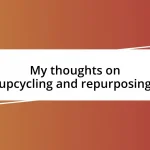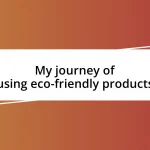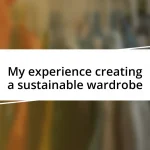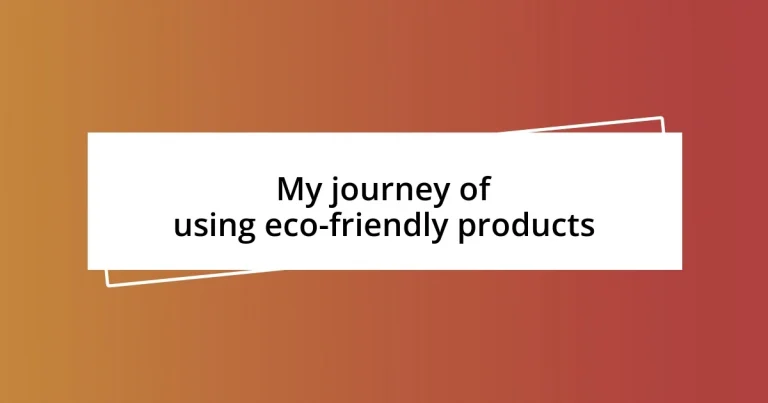Key takeaways:
- Transitioning to eco-friendly products fosters a healthier lifestyle and creates a sense of community focused on sustainability.
- Challenges such as accessibility, adjustment, and budget constraints can arise, but eco-friendly products often prove to be more durable and cost-effective over time.
- Adopting eco-friendly habits can begin with small changes, research into sustainable brands, and embracing creativity to enhance personal well-being and environmental impact.
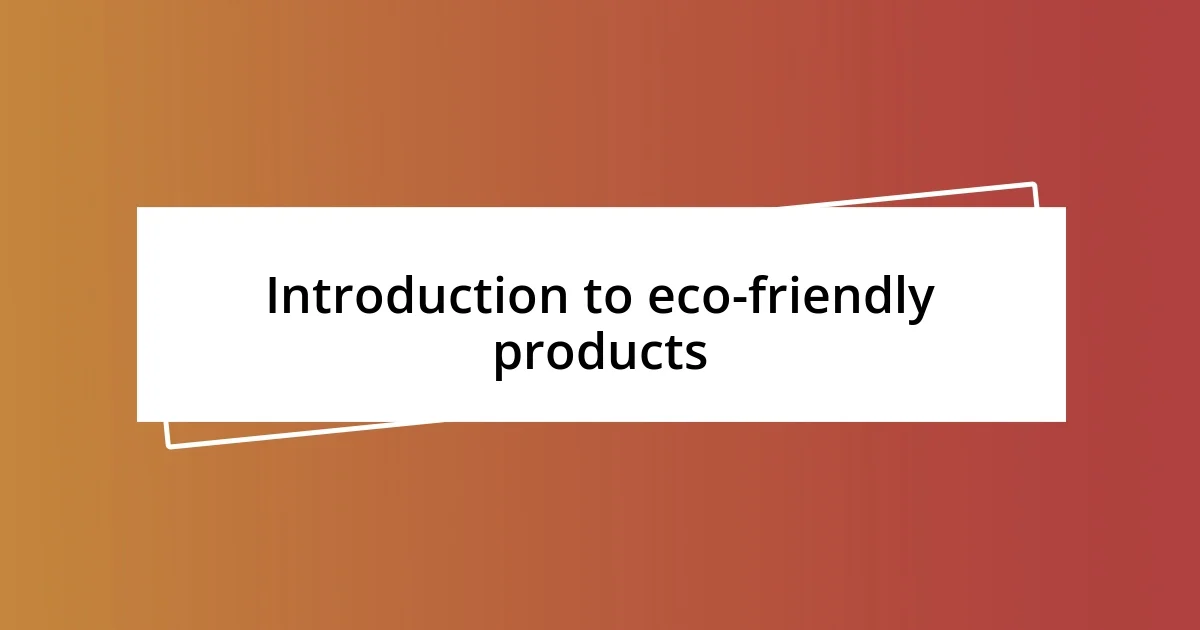
Introduction to eco-friendly products
When I first stumbled upon the idea of eco-friendly products, I was intrigued but unsure of their real impact. It felt like an overwhelming shift from my regular choices, but I couldn’t help but wonder: could these small changes lead to something bigger? Eco-friendly products are designed with sustainability in mind, often crafted from natural materials that reduce harm to our planet.
As I transitioned into using more eco-conscious items, I realized these products aren’t just about being kind to the Earth; they also promote a healthier lifestyle. For instance, switching to bamboo toothbrushes not only made my morning routine feel more satisfying, but it also sparked conversations with friends who were curious about the switch. I felt a growing sense of community through this shared commitment to sustainability.
Each time I chose an eco-friendly option, it felt like I was casting a vote for a cleaner environment. I remember the first time I used a reusable shopping bag – it was such a simple act, yet I felt proud, as if I was contributing to a larger cause. These products challenge us to rethink our consumption habits and encourage us to embody the change we wish to see in the world. It’s not just about the products themselves; it’s about fostering a mindset that values our planet and future generations.
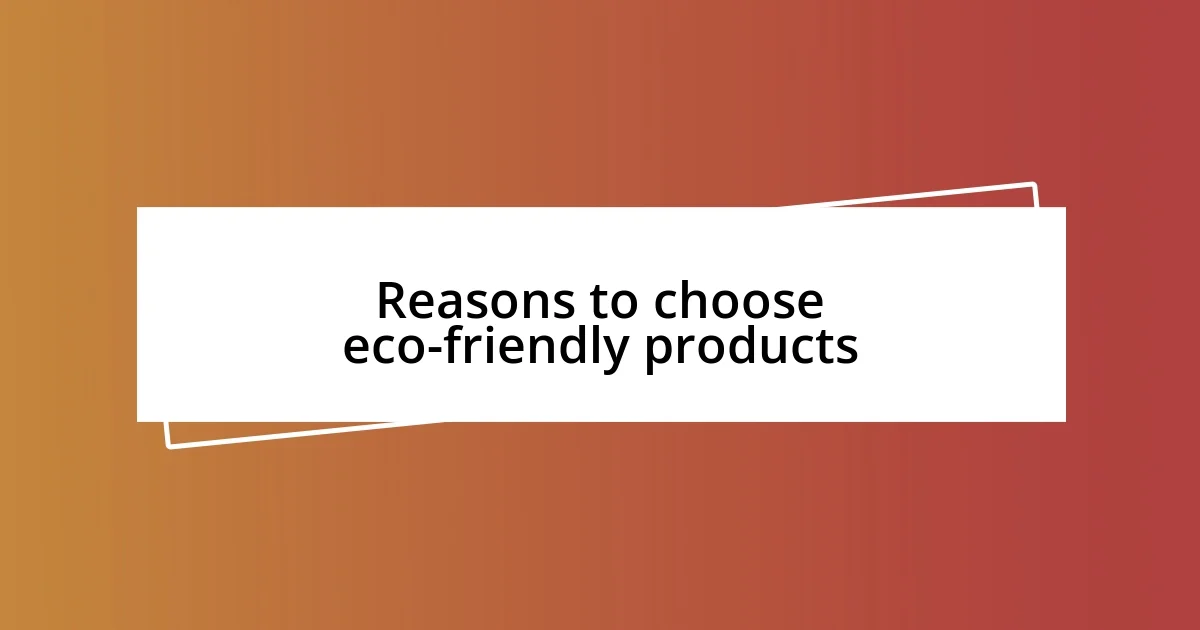
Reasons to choose eco-friendly products
Choosing eco-friendly products provides a multitude of benefits, not just for the environment, but for our personal well-being as well. When I switched to biodegradable cleaning supplies, I noticed something remarkable: my home felt fresher, devoid of those harsh chemical smells. I realized that making this choice wasn’t just about reducing waste, it was also about creating a healthier space for my loved ones.
Another significant reason for opting for eco-friendly products is the support they give to sustainable practices and businesses. I remember my excitement when I purchased my first zero-waste shampoo bar. Not only did it work exceptionally well, but I felt a genuine connection to the artisans who crafted it. Supporting companies that prioritize sustainability means I’m investing in a future that promotes environmental conservation.
Lastly, the financial aspect cannot be overlooked. Although some eco-friendly products come with a higher upfront cost, they tend to be more durable and often save money in the long run. For example, buying a stainless steel water bottle might seem pricier initially, but it replaced countless plastic bottles over time. It’s easy to overlook that these choices often lead to savings, while contributing positively to the planet.
| Eco-Friendly Products | Conventional Products |
|---|---|
| Biodegradable cleaning supplies | Harsh chemical cleaners |
| Zero-waste shampoo bars | Traditional bottled shampoos |
| Reusable water bottles | Single-use plastic bottles |
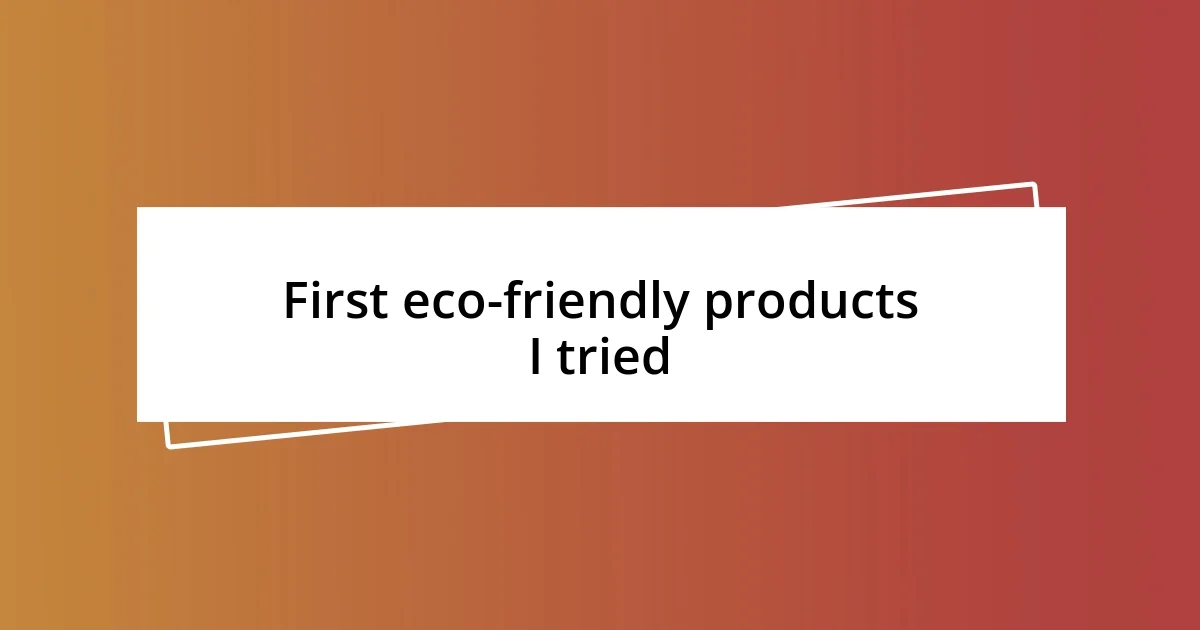
First eco-friendly products I tried
Switching to eco-friendly products was like stepping into a new and exciting world for me. My first experience was with a package of organic cotton makeup pads. I vividly remember unwrapping them and feeling a twinge of excitement, knowing that I was reducing waste in my beauty routine. It was such a small change, but every time I reached for those pads instead of disposable ones, I felt a sense of accomplishment.
- Organic cotton makeup pads
- Bamboo toothbrush
- Reusable produce bags
The first time I used a bamboo toothbrush, it struck me—this was an everyday item transformed into something extraordinary. The moment I brushed my teeth, I could feel the crispness of the bamboo, and it sparked a curiosity in me about sustainability that I hadn’t explored before. It wasn’t just the toothbrush itself that changed my routine; it symbolized my commitment to a greener lifestyle, making me more mindful of the products I chose. That simple, natural switch made my morning ritual feel purposeful and connected me to a larger community dedicated to sustainability.
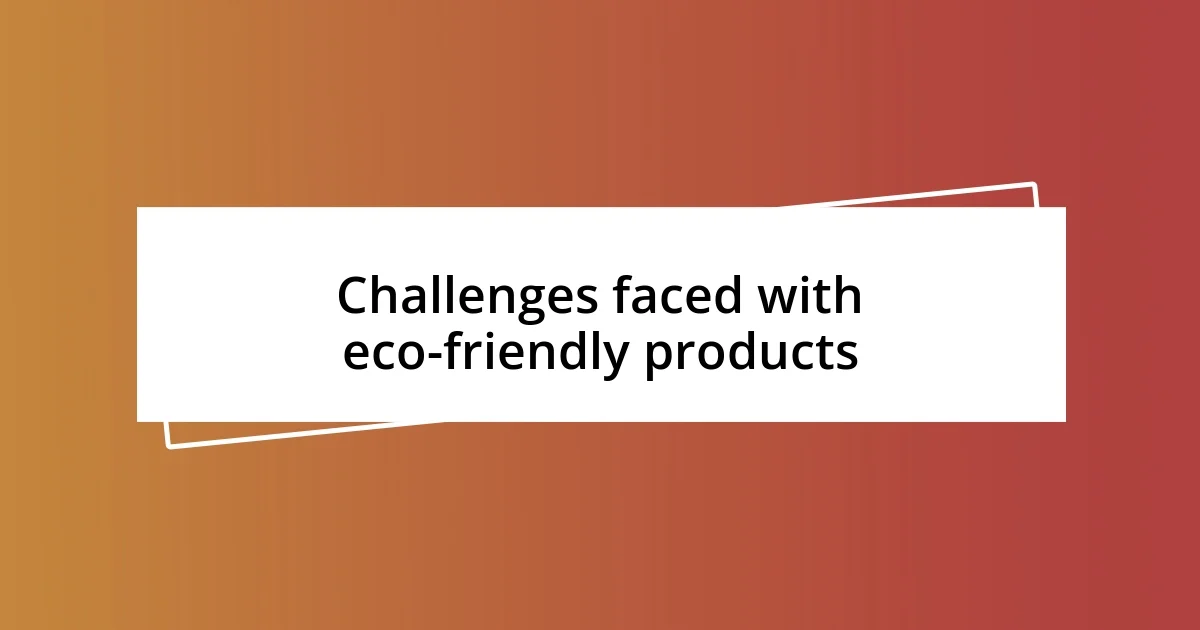
Challenges faced with eco-friendly products
Making the switch to eco-friendly products wasn’t always a walk in the park. One challenge that I encountered was accessibility. I remember hunting down my favorite sustainable brands only to find them in specialty stores far from where I lived, or worse, not available at all. It made me wonder—how can we truly embrace eco-friendly living if the products we need aren’t readily available?
Another obstacle I faced was the adjustment period with some of these products. For example, my first attempt at using glass containers for food storage left me feeling frustrated. They were heavier and, at times, felt less practical than the plastic ones I was used to. It forced me to reflect: was my old way of thinking about convenience getting in the way of making more sustainable choices?
Budgetary constraints can also be daunting. I still vividly recall the moment I hesitated at the checkout counter, eyeing the eco-friendly dish soap that cost nearly double the conventional options. It raised a pressing question in my mind: how could I balance my commitment to the environment with my financial responsibilities? Ultimately, I learned that while the upfront costs might be higher, the value they bring in terms of longevity and health benefits makes them worth it in the long run.
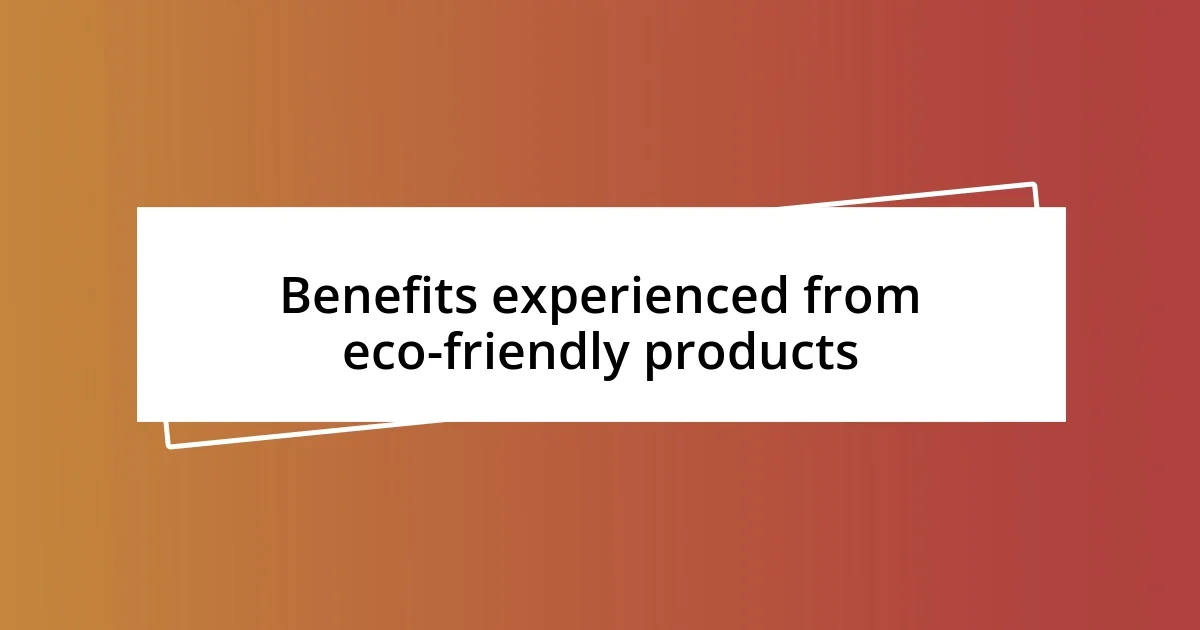
Benefits experienced from eco-friendly products
One of the most rewarding benefits I experienced from using eco-friendly products was the improvement in my overall well-being. When I switched to natural cleaning products, I noticed a significant drop in my allergies. The scent of harsh chemicals was replaced by earthy fragrances, making my home feel like a sanctuary. Have you ever thought about how the air quality in your home impacts your health?
Beyond personal health, using sustainable products gave me a deeper connection to the environment. When I began using reusable produce bags, I felt like a small part of a much larger movement. Each time I brought them to the store, a sense of pride washed over me, knowing I was contributing to a reduction in plastic waste. It’s gratifying to know that my choices can have a positive impact—doesn’t that motivate you to make eco-friendly swaps?
The financial aspect of eco-friendly products has also surprised me. Initially, I assumed that opting for sustainable options would drain my wallet. However, I discovered that, in the long run, many eco-friendly products are built to last. For instance, my bamboo toothbrush has outperformed any plastic version I’ve used, making it a cost-effective choice. It made me wonder: how often do we prioritize convenience over quality?
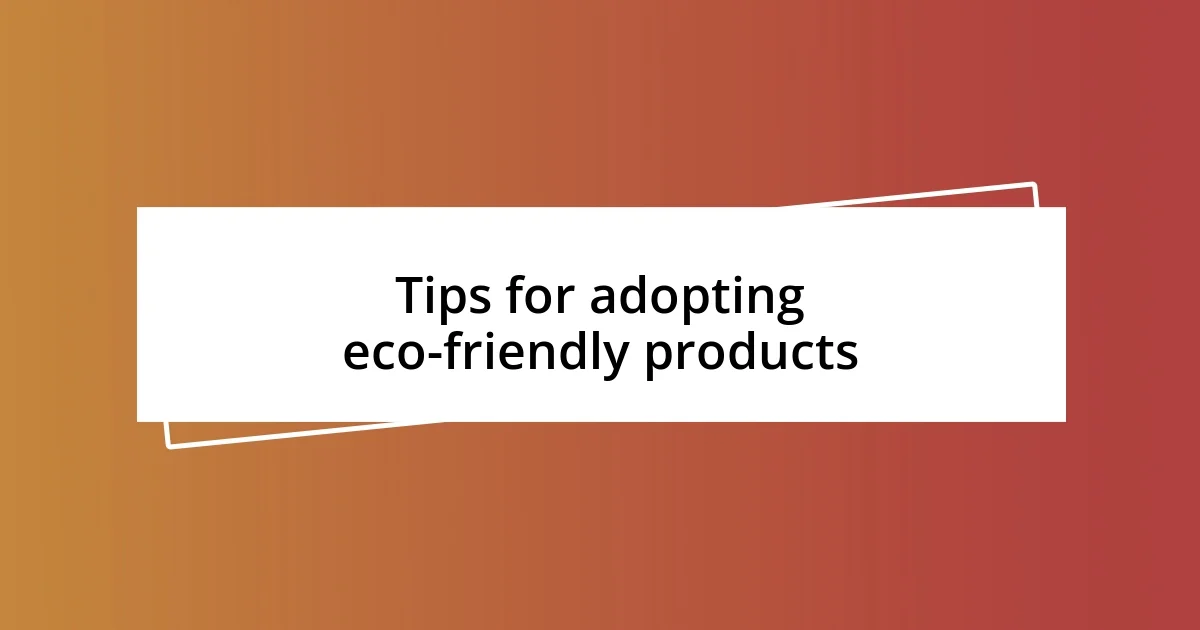
Tips for adopting eco-friendly products
When I decided to dive into the world of eco-friendly products, I realized that starting small can make a big difference. I began by swapping out my everyday items, like choosing a reusable water bottle over single-use plastic. Have you ever thought about how one simple change could ripple out to impact your entire lifestyle? This gradual approach helped me gain confidence in my choices without feeling overwhelmed.
As I expanded my eco-friendly arsenal, I discovered the importance of researching brands. It became almost like a treasure hunt, learning which companies prioritize sustainability and ethical sourcing. I remember feeling excited when I found a local brand that used recycled materials for their packaging. The thrill of supporting a business that aligned with my values was incredibly satisfying. Do you find it rewarding to support local or sustainable businesses, too?
Finally, I learned to embrace creativity in my sustainable journey. Instead of seeing it as a chore, I started to view eco-friendly living as an opportunity for innovation. For instance, I took a small glass jar and transformed it into a chic storage solution for my bathroom essentials. This not only saved me money but also reduced my waste. Have you ever turned a simple idea into something genuinely unique? Being resourceful made my experience enjoyable and fulfilling.




